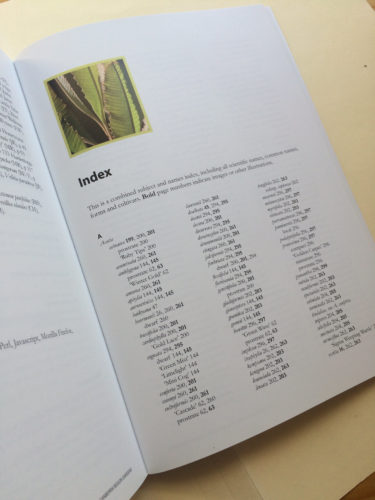Indexing services
An index is especially essential for non-fiction documents. To create an index for your publication, I read and interpret the content to select a list of important terms and concepts that will be relevant to the reader.
The index terms are organised as main entries and sub-entries in a list that is sorted alphabetically. Each index entry has a locator to guide the reader to the location where this subject is discussed. The locator can be a page number to a physical page, or a hyperlink to a specific location in an electronic document.
In a way, the index is an intelligent summary of your publication, broken down in terms that are relevant to the reader. An index can significantly improve the quality of your publication.
Does your document need an index?
Documents that need an index include:
- manuals and instruction documents
- reports and papers over 50 pages
- technical or scientific books
- guide books and reference manuals
- historical books
- cook books and self-help books.
Almost any non-fiction document that is over 50 pages will greatly benefit from having an index.
If you want your non-fiction book to be a success with the readers, a good index is essential!

What is an index?
The index is a user-friendly, functional and a comprehensive interpretation of the content in your book.
It is much more than a list of important keywords and cannot be produced through a computer program.
A professional high-quality index:
- represents all the ideas in your book
- contains the important terms used by the author and the terms likely to be sought by the reader
- contains internal cross-references to bring the reader to the correct location
- is concise and clear.
The value of an index
When there is no index, the reader will be restricted to using the contents table to find information.
This takes much longer than finding a subject in an index. It also requires the reader to read, or at least scan, the contents list each time they want to find something.
The index is the reader’s pathway to all the information in your book, manual or report. It will:
- take the reader quickly and directly to the location where a subject is discussed
- show where related topics are discussed
- save time and effort for the reader.
In a non-fiction book, the reader expects to find an index. This means that even short reports benefit greatly from a back-of-book index.
How to plan the indexing of your document?
To index your document or book, I read the entire document. I then determine the main index entries and subentries. This is a careful process and takes time. Therefore the indexing phase needs to be planned into your publication schedule.
The index can only be created once the pagination is fixed. This means the indexing process needs to occur after document design and layout, and preferably also after proofreading.
The time required to create your index will depend on the number of pages and the complexity of the subject.
Indexing skills
I have indexed a variety of documents, including reports, annual reports, books, manuals and reference works.
My subject areas are government reports, scientific documents (in particular botanical, biological, environmental, medical), software manuals and other technical documentation.
Project examples: see under indexing
Cost details
Indexing costs are calculated at an hourly rate, based on the type of document and complexity of subject matter.
Please contact me early to ensure I will be available for indexing at the time you require.

